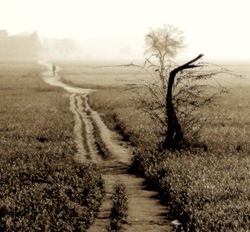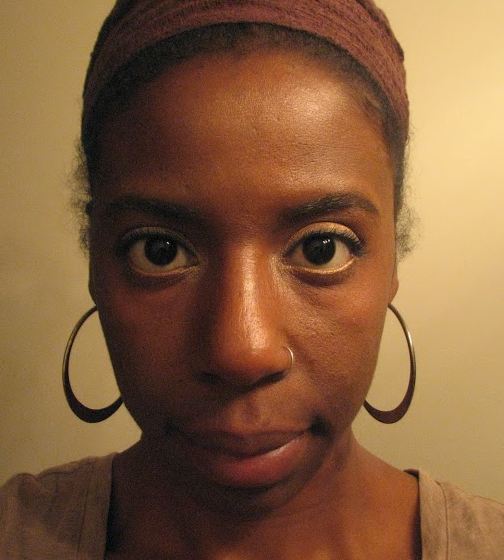|
9/21/2011 Confessions of a Present Day Anarchist My name is Nekeisha and I was not born a radical. This revelation is probably not much of a revelation at all—very few people I know can honestly claim to have had a revolutionary outlook on the world upon exiting the womb. The bigger surprise might just be how “un-radical” I used to be for much of my life and how painstaking of a process it was for me to adopt a Christian and anarchist perspective as my own. Dubbed a “Super-Christian” by high-school, I was the kind of teen that didn’t drink, smoke, or do drugs, and who had no problem telling anyone who would listen about my choices. I was a proud soldier in the True Love Waits brigade, a lover of Christian musicians (Carman, Newsboys and Michael W. Smith anyone?), and an avid reader of Focus on the Family publications. I believed strongly in hell and knew for a fact that nonbelievers and other unseemly types were going to end up there. I was no war-mongerer but I was definitely no pacifist, believing instead in the right to violent self-defense if needed. Jesus as Son of God was indisputable to me. But Jesus the nonviolent revolutionary who overturned social systems of domination was a foreign concept. I was what some might call your typical evangelical Christian, part of what some us would say is wrong with the church today. Unless someone out there counts listening to Alice in Chains on the low-low or being a bit of a “tom-boy” or giving the usual teenage attitude signs of a budding radical, there was nothing obvious in my upbringing to suggest I would be anything near who I am now. Few people I know understand the remarkable shift I have made since my early days as a Jesus-follower. Though some things have remained the same—I still don’t smoke or do drugs; I still think highly of monogamous covenantal relationships; I still think hell is a possibility (albeit with a more nuanced theological perspective); and yes, I still know some of the lyrics to Amy Grant’s “Baby”—a lot about me has changed. How did that person become this person writing this reflection? To what do I owe this transformation, besides the slow and steady moving of God’s Spirit? Trying to name all the influential moments on my pathway is neither possible nor necessary in this space. Chances are I would miss more than a few things in retelling the tale, and some of the details would probably bore you, dear reader, to tears. Yet, I think I can safely say that many of these moments integrated personal characteristics I had developed within my somewhat mainstream Christian home with individuals I met who did not hold my ideas against me. Learning to be an independent spirit that did not blindly follow my peers. Being a brown female immigrant who learned quite quickly the injustices associated with those categories. Witnessing family members as they showed acts of openness and hospitality, even to those who mistreated them. Feeling compelled to stand by the underdog and to be a friend to the people society had deemed worthless. These traits helped me enter into conversations with individuals who engaged me in new political ideas with patience, challenged my faith in a spirit of humility and respected me as a fellow human being who could indeed handle new truths when shared in a context of grace. I think it is safe to say that without the interplay of these two areas—the person I was becoming with the people I met—I would be someone else entirely. This interplay has taken many forms over the years. It has looked like a high school teacher in a public state-run educational institution assigning Howard Zinn’s A People’s History of the United States and sending us to a Maoist bookstore to purchase it. It has taken the shape of a Mennonite convert and anarchist being willing to get into long discussions about Jesus and theology and the Bible using technological tools like AOL Instant Messenger (remember that?). It has come about from reading the Sermon on the Mount for the first time as a 21-year old, and reading John Howard Yoder’s What Would you Do? It has looked like voting in my first election and becoming disillusioned as the Supreme Court gave power to George Bush the Second. It has taken the form of joining a bunch of lefty leaning young adults who welcomed me into their peace club as a Christian when Christians were busy calling for war. It took the shape of getting arrested (non-voluntarily) during one of those symbolic, mostly Democrat-driven protests. It has taken the form of long conversations with loving friends who hear me out on topics like sexuality and the church as we sit in a seminary lounge. It has come about from reading books, writing essays, conversing in classrooms and interactions at conferences as I worked toward one of those evil Masters degrees. In short, my radicalization process has not really been that radical at all. In fact, some might say it is either downright mundane or maybe even corrupt, wrapped up as it is in some of the very systems radical Christianity, anarchism, and I like to criticize. Yet, that very process has made me who I am and without it neither I nor this site would exist. So, what is the point? Why divulge all this now? Recently, there has been a lot of talk in various places on this site about who and what is and is not “really” radical. Is Derrick Jensen really a radical? Is Bill McKibben? How about Jesus Radicals—are we still living up to the latter part of our name? Is stewardship radical? How about civil disobedience? Is the Christian Left still radical? Were they ever radical in the first place? Are we all too radical for change? Are we too radical for other radicals? How are we defining radical again? Is it possible for the same person/group/ideology to be radical in some ways and not radical in others? Although I think it is important to engage the question of what it does and doesn’t mean to live radically in this world, sometimes the conversation makes me uncomfortable. Are we asking these questions with the hope that in so doing we can challenge others to stretch their ways of thinking and being into something more transformative and revolutionary? Or are we asking out of a judgmental, dismissive or, dare I say, self-righteous spirit? Are we offering our critique with a sense of appreciation for what other change-agents have brought to the table, flawed as some of their analysis or practices might be? Or are we analyzing others with the view that they will never measure up to our level of radicality? Are we seeking to be iron sharpening iron for the betterment of all? Or are we seeking to be iron that cuts down, offering little else in return? I believe in being discerning and critical, dissecting and challenging. I believe in holding our sacred cows, including all our movements, ideas, practices and even Web sites, up to a critical and illuminating light that pushes us and others to go deeper into the work of resisting interpersonal, social, ecological, economic, systemic and other evil. But as someone who once was a long ways away from even thinking in these terms, I don’t think I would ever have come as far as I have if I was faced with judgment and dismissal, instead of prophetic patience and grace. What kind of place is Jesus Radicals? Is our criticism constructive? Are we a place of prophetic patience and grace? When I reflect on my own history, I am confronted with the realization that what was once un-radical can, through diligent, ongoing engagement, be moved to another way of living in this screwed up yet beautiful world. I would like to think that I am not a fluke of nature—that other mainstream people, groups, movements, and endeavors can be positively affected by diligent, ongoing engagement with people of increasingly radical stripes, including this peculiar bunch of Christians and anarchists. This does not mean being slow to confront injustice or slow to point out differences between political ideologies and practices or slow to name when some action or movement may be inadequate for the realities we now face. I am not suggesting we need a “Can’t we all just get along?” kind of existence that glosses over our differences. To be an anarchist is to be different from other kinds of radicals. What I am wondering, however, is whether it is possible to engage others who are seeking change in ways that are not like ours in another kind of spirit—one that acknowledges that many of us did not start off where we are now and others do have room to (and often can) grow. I think it is possible because it is my own story. Do we want to be part of others’ stories as well?
|
Disclaimer
The viewpoints expressed in each reader-submitted article are the authors own, and not an “official Jesus Radicals” position. For more on our editorial policies, visit our submissions page. If you want to contact an author or you have questions, suggestions, or concerns, please contact us. CategoriesAll Accountability Advent Anarchism Animal Liberation Anthropocentrism Appropriation Biblical Exegesis Book Reviews Bread Capitalism Catholic Worker Christmas Civilization Community Complicity Confessing Cultural Hegemony Decolonization Direct Action Easter Economics Feminism Heteropatriarchy Immigration Imperialism Intersectionality Jesus Justice Lent Liberation Theology Love Mutual Liberation Nation-state Nonviolence Occupy Othering Pacifisim Peace Pedagogies Of Liberation Police Privilege Property Queer Racism Resistance Resurrection Sexuality Solidarity Speciesism Spiritual Practices Technology Temptation Veganism Violence War What We're Reading On . . . White Supremacy Zionism ContributorsNekeisha Alayna Alexis
Amaryah Armstrong Autumn Brown HH Brownsmith Jarrod Cochran Chelsea Collonge Keith Hebden Ric Hudgens Liza Minno Bloom Jocelyn Perry Eda Ruhiye Uca Joanna Shenk Nichola Torbett Mark VanSteenwyk Gregory Williams Archives
October 2017
|
Search by typing & pressing enter


 RSS Feed
RSS Feed